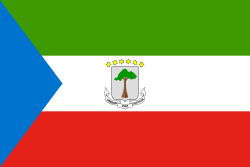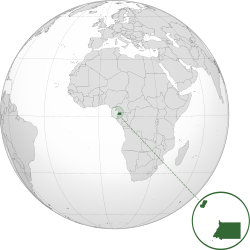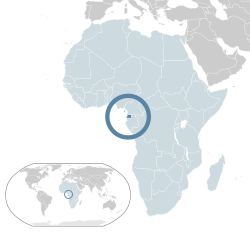Republic of Equatorial Guinea
| |
|---|---|
| Motto: Unidad, Paz, Justicia (Spanish) "Unity, Peace, Justice" | |
| Anthem: Caminemos pisando las sendas de nuestra inmensa felicidad (Spanish) Let Us Walk Treading the Paths of Our Immense Happiness | |
| Capital | Malabo (current) Ciudad de la Paz (under construction) 3°45′N 8°47′E / 3.750°N 8.783°E |
| Largest city | Bata, Malabo |
| Official languages | |
| Recognised regional languages | List |
| Ethnic groups (2020) | |
| Religion (2020) |
|
| Demonym(s) | |
| Government | Unitary dominant-party presidential republic under a dictatorship |
| Teodoro Obiang Nguema Mbasogo | |
| Teodoro Nguema Obiang Mangue | |
| Manuel Osa Nsue Nsua | |
| Joaquín Asong Owono Mbang | |
| Legislature | Parliament |
| Senate | |
| Chamber of Deputies | |
| Independence from Spain | |
Declared | 12 October 1968 |
| Area | |
Total | 28,050 km2 (10,830 sq mi) (141st) |
Water (%) | negligible |
| Population | |
2024 estimate | 1,795,834 (154th) |
| GDP (PPP) | 2025 estimate |
Total | |
Per capita | |
| GDP (nominal) | 2025 estimate |
Total | |
Per capita | |
| HDI (2022) | medium (133rd) |
| Currency | Central African CFA franc (XAF) |
| Time zone | UTC+1 (WAT) |
| Date format | dd/mm/yyyy |
| Calling code | +240 |
| ISO 3166 code | GQ |
| Internet TLD | .gq |
| |
Table of Contents
Introduction to Securities Law in Equatorial Guinea
Securities law in Equatorial Guinea serves as a crucial framework designed to regulate and oversee the country’s securities market, ensuring the integrity of trading practices and the protection of investors. The legal structure governing securities encompasses a variety of regulations that address the issuance, distribution, and trading of financial instruments, including stocks and bonds. This framework aims to foster confidence among investors and encourage participation in capital markets, which is essential for economic growth.
In Equatorial Guinea, the foundation of securities law is built on several key elements, including definitions of essential terms such as “security,” “issuer,” and “market participant.” These definitions provide clarity and precision, which are vital in a field characterized by rapid developments and complex financial transactions. Understanding these concepts is fundamental for anyone involved in the financial markets, including investors, regulators, and analysts, as they lay the groundwork for complying with securities regulations.
The importance of securities law goes beyond mere compliance; it is pivotal in promoting fair trading practices and maintaining market integrity. By establishing guidelines and standards, securities laws protect investors from malpractices such as insider trading, fraud, and market manipulation. These protections are essential in creating a trustworthy environment where investors can operate with confidence, facilitating capital inflow and sustainable economic development in the region.
Furthermore, a well-defined legal framework not only enhances transparency but also aids in the development of a vibrant securities market, offering various investment opportunities for local and international investors. This introduction to the basics of securities law in Equatorial Guinea sets the stage for exploring more detailed aspects, including the regulatory bodies, compliance requirements, and the interplay between domestic and international regulations that will be discussed in later sections of this blog post.
Regulatory Authority Over Securities and Stock Exchanges
In Equatorial Guinea, the regulation of securities and stock exchanges is primarily overseen by the Ministry of Finance. This government body plays a crucial role in formulating and enforcing regulations that govern the securities market. The Ministry ensures compliance with relevant laws and guidelines, thereby facilitating a stable financial environment conducive to investment. Within the Ministry, specific divisions are tasked with addressing various facets of securities regulation, including the oversight of public offerings, trading practices, and market participants.
Additionally, the Central Bank of Equatorial Guinea functions as an integral regulatory authority. It is responsible for the monetary policy framework and ensures the transparent operation of financial markets. The Central Bank monitors liquidity and monetary stability, which are essential for the proper functioning of the securities market. By safeguarding against excessive risk-taking and ensuring prudent management practices, the Central Bank contributes significantly to maintaining investor confidence.
Furthermore, there are quasi-governmental organizations and oversight committees that are involved in regulatory processes. These entities often focus on specific sectors within the securities landscape, offering specialized insights and promoting adherence to best practices. Their role includes conducting investigations into potential market malpractices and ensuring that all market participants operate under the rule of law. Their active involvement is key to the integrity of the market and helps in preventing fraud and manipulation.
The significance of these regulatory bodies cannot be overstated. They act as a safeguard for investors, fostering a climate of trust and stability. By ensuring transparency and accountability, they create a level playing field where all investors, both local and foreign, can engage with confidence. The efficient operations of these authorities are essential for the overall health and growth of the securities market in Equatorial Guinea.
Overview of the Equatorial Guinea Stock Exchange
The Equatorial Guinea Stock Exchange, known as Bolsa de Valores de Guinea Ecuatorial, serves as a pivotal component of the nation’s financial infrastructure. Established in 2010, its primary goal was to promote the development of a robust capital market, facilitating investment opportunities for both local and foreign investors. As the only stock exchange in Equatorial Guinea, it endeavors to provide a platform for raising capital, thereby supporting the growth of businesses and stimulating economic development.
The stock exchange has emerged as a vital tool in diversifying the economy, particularly in a country heavily reliant on oil and gas sectors. It aims to attract companies from various industries, promoting equity financing and creating a broader investment landscape. The Exchange operates under the supervision of the Ministry of Finance, Economic Planning, and the Central Bank, which ensures regulatory compliance and enhances investor confidence.
Currently, the Equatorial Guinea Stock Exchange features a range of securities, including equities, bonds, and government instruments. These financial products offer investors diverse options for engagement in the country’s economic activities. The establishment of the exchange has also encouraged transparency and corporate governance among listed companies, fostering a more favorable investment climate.
One distinguishing characteristic of the Equatorial Guinea Stock Exchange is its commitment to local businesses. It provides tailored solutions to small and medium-sized enterprises (SMEs), enabling them to access essential funding. Additionally, educational initiatives aimed at improving financial literacy among potential investors have become a notable feature of the exchange’s operations, empowering individuals to make informed investment decisions.
In summary, the Equatorial Guinea Stock Exchange plays a critical role in the nation’s economy, offering opportunities for investment while supporting the development of a diverse market that benefits both businesses and investors alike.
Listing Requirements for Companies in Equatorial Guinea
In Equatorial Guinea, the process for a company to be listed on the stock exchange is governed by a series of stringent requirements aimed at ensuring financial stability and transparency. One of the primary prerequisites is meeting the minimum capital requirement. Companies intending to list must demonstrate a sufficient amount of registered capital, which varies depending on the category of the company and the sector it operates within. This capital threshold helps to ensure that the entity has a solid financial foundation for potential investors.
Additionally, adherence to established financial reporting standards is crucial for companies seeking to enter the stock exchange. Companies must prepare their financial statements according to recognized international accounting standards, which promote consistency and transparency in financial reporting. These statements often need to be audited by an independent third party to further enhance credibility and provide reassurance to investors regarding the company’s financial health.
Corporate governance norms also play a significant role in the listing process. Companies are expected to have a well-defined governance structure in place, consisting of a competent board of directors and clear guidelines for decision-making processes. These norms are designed to protect the interests of shareholders and ensure that the company operates responsibly and ethically.
The path to an initial public offering (IPO) involves compliance with various regulatory procedures. Companies must submit a detailed prospectus outlining their business model, financial data, and risks associated with the investment. This document is subject to regulatory review before the IPO can proceed, ensuring comprehensive disclosure for potential investors. Once listed, companies must adhere to ongoing obligations, including regular financial disclosures and compliance with corporate governance standards, which ensures sustained investor confidence and market integrity.
Investor Protections Under Equatorial Guinea’s Securities Law
Equatorial Guinea has instituted a comprehensive framework of securities laws and regulations aimed at ensuring the protection of investors within its financial markets. These legal measures are designed to foster a fair and transparent investment environment by deterring fraud, insider trading, and market manipulation. Central to these protections are laws that mandate full disclosure from entities operating in the securities market, thereby ensuring that investors have access to pertinent information necessary for informed decision-making.
One of the cornerstones of investor protection in Equatorial Guinea is the requirement for companies to regularly disclose financial information and other relevant data. These disclosure requirements serve to level the playing field, enabling all market participants to assess risks accurately and make judicious investment choices. Moreover, there are strict prohibitions against insider trading, which is viewed as a significant threat to market integrity. By criminalizing this unethical practice, Equatorial Guinea seeks to cultivate investor confidence, encouraging local and international investments alike.
The role of regulatory oversight cannot be overstated. Equatorial Guinea has established regulatory bodies tasked with monitoring compliance within the securities markets. These entities are responsible for enforcing laws and regulations, thus acting as a bulwark against potential violations that could undermine investor trust. Regulatory measures include regular audits, investigations into market activities, and enforcement actions against malfeasance in the securities sector. Such oversight is crucial for maintaining a fair investment climate and ensuring that investors are protected from potential abuses.
In summary, the investor protections enacted under Equatorial Guinea’s securities law serve as a vital mechanism for enhancing market transparency and fairness. Understanding these laws equips investors with the knowledge they need to navigate the securities landscape confidently, knowing that the regulatory framework is designed to shield their interests and promote ethical market conduct.
Challenges Facing Securities Regulation in Equatorial Guinea
The securities regulatory framework in Equatorial Guinea encounters several notable challenges that affect its effectiveness and the overall integrity of the financial market. One primary issue is the limited awareness and understanding of securities among potential investors. Many individuals and businesses lack the knowledge required to navigate the complexities of investing in securities, which is exacerbated by a shortage of educational programs and resources aimed at improving investor literacy. This situation hinders the broader participation of the public in the capital markets, thereby constraining market growth.
In addition to investor awareness, insufficient enforcement resources pose a significant challenge. The regulatory authorities in Equatorial Guinea often operate with limited personnel and funding, which inhibits their ability to monitor, regulate, and enforce compliance effectively. Consequently, this could lead to lapses in monitoring market activities and potential misuse of authority by participants within the market, such as insider trading or securities fraud. The lack of adequate enforcement mechanisms contributes to a perception of inefficiency and may further discourage potential investors from entering the market.
Moreover, regulatory gaps represent another considerable obstacle to establishing a robust securities market. The existing legal framework may not cover all aspects of modern financial transactions and may require updates to address emerging challenges, particularly in a rapidly changing global economic environment. These regulatory ambiguities can create uncertainty among investors, ultimately eroding their confidence and willingness to engage in securities trading.
These challenges—limited investor awareness, inadequate enforcement resources, and regulatory gaps—collectively hinder the growth and development of the securities market in Equatorial Guinea. Addressing these issues is crucial for enhancing market participation and restoring investor faith in the regulatory system, thereby fostering a more dynamic and sustainable financial landscape.
International Standards and Comparisons
The landscape of securities law and stock exchange regulations in Equatorial Guinea is an evolving theme, particularly when compared to established international standards. In many jurisdictions, such as the United States and the United Kingdom, securities regulations are well-defined and designed to protect investors, ensure fair trading practices, and promote market stability. This advanced regulatory framework emphasizes the importance of transparency and accountability, establishing a solid foundation for investor confidence. Equatorial Guinea, however, faces challenges in aligning its regulations with these global standards.
One of the critical advantages of adhering to international practices is the enhancement of investment attractiveness. Investors from abroad typically favor markets with robust legal frameworks and strict compliance measures. By adopting internationally recognized standards, Equatorial Guinea can foster a more attractive investment climate. Countries such as South Africa have made significant strides by introducing effective regulatory measures that encourage foreign direct investment (FDI). The establishment of a similar framework in Equatorial Guinea could lead to increased global investment flows, bolstering economic growth.
Moreover, regulatory alignment can facilitate Equatorial Guinea’s integration into global financial markets. Compliance with international standards can help build relationships with key stakeholders, including international financial institutions and investors seeking stable markets. Steps that Equatorial Guinea might consider include enhancing the legal framework surrounding securities issuance, increasing regulatory oversight, and investing in training for regulators. Such measures would not only elevate the local market but also align it with best practices observed in more developed economies.
In summary, while Equatorial Guinea has made progress in developing its securities laws and regulations, a thorough comparison with international standards reveals areas for improvement. By embracing global best practices, the nation can enhance its market’s appeal and promote economic development through greater international integration.
Future of Securities Regulation in Equatorial Guinea
The future of securities regulation in Equatorial Guinea appears promising, primarily due to anticipated developments aimed at enhancing the efficiency and transparency of the financial market. As the nation seeks to attract foreign investment, there is likely to be a concerted effort to reform existing regulations. These reforms may include streamlining the regulatory framework, introducing clearer guidelines, and implementing advanced compliance mechanisms that align with international best practices.
One of the anticipated changes is the potential adoption of updated securities laws that address current market conditions and participant needs. This evolution is essential for fostering a more robust investment climate and instilling investor confidence. Furthermore, the government is expected to enhance coordination between regulatory agencies, which can streamline processes, avoid overlaps, and present a unified front to both domestic and international investors.
Technological advancements will play a significant role in the evolution of the securities market in Equatorial Guinea. The introduction of digital platforms for trading and information dissemination could notably improve market accessibility, reducing barriers for both local and foreign investors. Implementing electronic trading systems may enhance transaction efficiency while providing real-time data, which is crucial for informed investment decisions. Moreover, technology can contribute to greater regulatory oversight through better monitoring of trading activities and compliance, thereby reinforcing transparency.
Additionally, as the global economy increasingly emphasizes sustainability and ethical practices, Equatorial Guinea may also consider developing policies within its securities regulations that promote socially responsible investing. By encouraging this approach, the country could position itself as an attractive destination for international investors who prioritize environmental, social, and governance (ESG) factors.
In conclusion, the future landscape of securities regulation in Equatorial Guinea is poised for transformation. By embracing reforms, leveraging technology, and aligning with global trends, the country can significantly enhance its investment appeal while ensuring a more dynamic and transparent financial market.
Conclusion and Key Takeaways
In summary, understanding securities law and stock exchange regulations in Equatorial Guinea is crucial for fostering a stable and healthy investment environment. The comprehensive legal framework delineates the obligations of all market participants, playing a vital role in ensuring fairness, transparency, and accountability within the financial markets. The proactive approach to regulatory developments is essential for mitigating risks and enhancing investor confidence.
Throughout this blog post, we highlighted several key aspects of the current securities laws in Equatorial Guinea. These regulations not only govern the operations of stock exchanges but also set the groundwork for various financial instruments, promoting capital formation and offering investors protection. It is clear that these regulations are designed to uphold market integrity and to safeguard the interests of both local and foreign investors.
Moreover, continuous improvements in these regulations are necessary to adapt to the ever-evolving global financial landscape. As economic conditions change and new challenges arise, the regulatory environment must also evolve to address emerging risks and ensure compliance with internationally accepted standards. This dynamic adjustment is essential for nurturing investor trust and advancing the overall investment climate in the region.
It is imperative for individuals and businesses involved in the Equatorial Guinean markets to remain vigilant and stay informed about ongoing changes to securities law and stock exchange regulations. Education and awareness are fundamental components for navigating the complexities of these legal frameworks. By doing so, stakeholders can better position themselves to capitalize on investment opportunities while mitigating potential risks associated with non-compliance.
Overall, comprehending the intricacies of securities law and stock exchange regulations is not merely beneficial; it is essential for anyone wishing to thrive in Equatorial Guinea’s financial environment. Through informed participation, investors can contribute to a robust market while enhancing their financial security.



